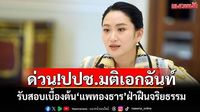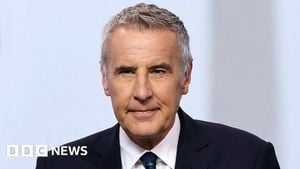On June 23, 2025, Thailand's law enforcement and anti-corruption bodies found themselves embroiled in high-profile investigations involving prominent figures tied to the Shinawatra family and sensitive national matters.
At the forefront, Police General Kittirath Phanphet, Commissioner-General of the Royal Thai Police, addressed the disciplinary situation concerning two doctors at the Police Hospital. These medical professionals, who also serve as police officers, have been penalized by the Medical Council over their involvement in the treatment of former Prime Minister Thaksin Shinawatra. General Kittirath clarified that the Royal Thai Police had yet to receive the official details of the Medical Council's sanctions. He emphasized the dual roles of these individuals—as doctors and police officers—highlighting that while the Medical Council's disciplinary action pertains specifically to medical misconduct, the police force must independently assess any breaches of police ethics and regulations.
"The case involves individuals who serve in dual roles as both medical professionals and police officers," General Kittirath explained. "The Medical Council's disciplinary action pertains to professional misconduct in patient care. The Royal Thai Police will consider the ethical aspects and relevant police regulations for potential disciplinary action against the doctors." He further noted that one of the doctors, Pol. Lt. Gen. Sophonrat Singhajaru, is a candidate for promotion to Deputy Commissioner-General of Police in October 2025, but his advancement will be subject to a thorough review of applicable criteria and conditions.
Meanwhile, the Medical Council is preparing to investigate a second batch of over five doctors connected to the transfer of Thaksin Shinawatra from Ratchathan Hospital to the Police Hospital's 14th floor. This probe emerged from an expansion of the initial ethical complaints. The council plans to follow a rigorous seven-step process, mirroring the first investigation, with the next detailed discussion scheduled for their July 2 meeting.
The seven steps include: an ethics subcommittee review with a four-month timeframe (extendable by two months), a screening subcommittee providing additional opinions within one to two months, and a main council review determining if the complaint has merit. If it does, the case proceeds to an investigative subcommittee that has six months to conclude guilt or acquittal. Subsequent steps involve legal experts reviewing the case, a final council decision on punishment, and possible submission to the Minister of Public Health. Appeals can be made to the Administrative Court if two-thirds of the council uphold the original ruling.
One insider from the Medical Council acknowledged that this second round of ethical investigations might take longer but stressed its importance given the connections to the initial complaints. They said, "When there is involvement, it cannot be overlooked; it must be thoroughly investigated to reach a conclusion." This meticulous process underscores the seriousness with which medical ethics are treated in cases involving high-profile political figures.
On a parallel track, the National Anti-Corruption Commission (NACC) also took decisive action on June 23, 2025. The commission unanimously accepted for preliminary investigation a complaint against Prime Minister Paetongtarn Shinawatra regarding a leaked audio clip of a conversation with Samdech Hun Sen, President of the Cambodian Senate.
The complaint alleges that the Prime Minister severely violated ethical standards, with the clip relating to contentious border disputes between Thailand and Cambodia. The NACC's investigation will involve transcribing and accurately translating the audio, considered crucial evidence, and interrogating relevant witnesses. The commission has urged a swift resolution, recognizing the high public interest but has not imposed a strict deadline for the preliminary inquiry.
This complaint was initiated by Senator Swasdi Tassana, chairman of the Senate Committee on Military and State Security, who gathered signatures from 36 senators to formally accuse the Prime Minister of misconduct and intentional abuse of power, violating the Constitution and laws, as well as ethical norms.
The NACC's resolution highlights the standard investigative process, which includes fact verification, witness hearings, and legal examination. The commission will provide regular updates to its committee throughout the inquiry.
Additionally, the Senate President, Mongkol Surasajja, has forwarded the complaint to the NACC and simultaneously sent the case to the Constitutional Court to determine whether the Prime Minister's actions warrant removal from office. This dual approach reflects the gravity of the allegations and the constitutional mechanisms in place for accountability.
Legal experts point to sections 45 and 87 of the Organic Act on Anti-Corruption B.E. 2561, which empower senators, members of parliament, or a significant number of voters to file complaints against officials for misconduct, corruption, or abuse of power. If the President of the State Assembly finds grounds for suspicion, the matter proceeds to the Supreme Court for appointing an independent investigative committee.
The ongoing investigations into the Shinawatra family's political and medical entanglements highlight the complex interplay between ethics, law enforcement, and political accountability in Thailand. For the Royal Thai Police, balancing the dual roles of officers who are also medical professionals presents unique challenges, especially when high-profile cases are involved.
Simultaneously, the NACC's swift action on the Prime Minister's alleged ethical breaches demonstrates the institution's role in maintaining governmental integrity amid politically sensitive disputes, such as the border tensions with Cambodia.
As these cases unfold, they will undoubtedly remain in the public eye, reflecting broader questions about governance, ethics, and justice in Thailand's evolving political landscape.





